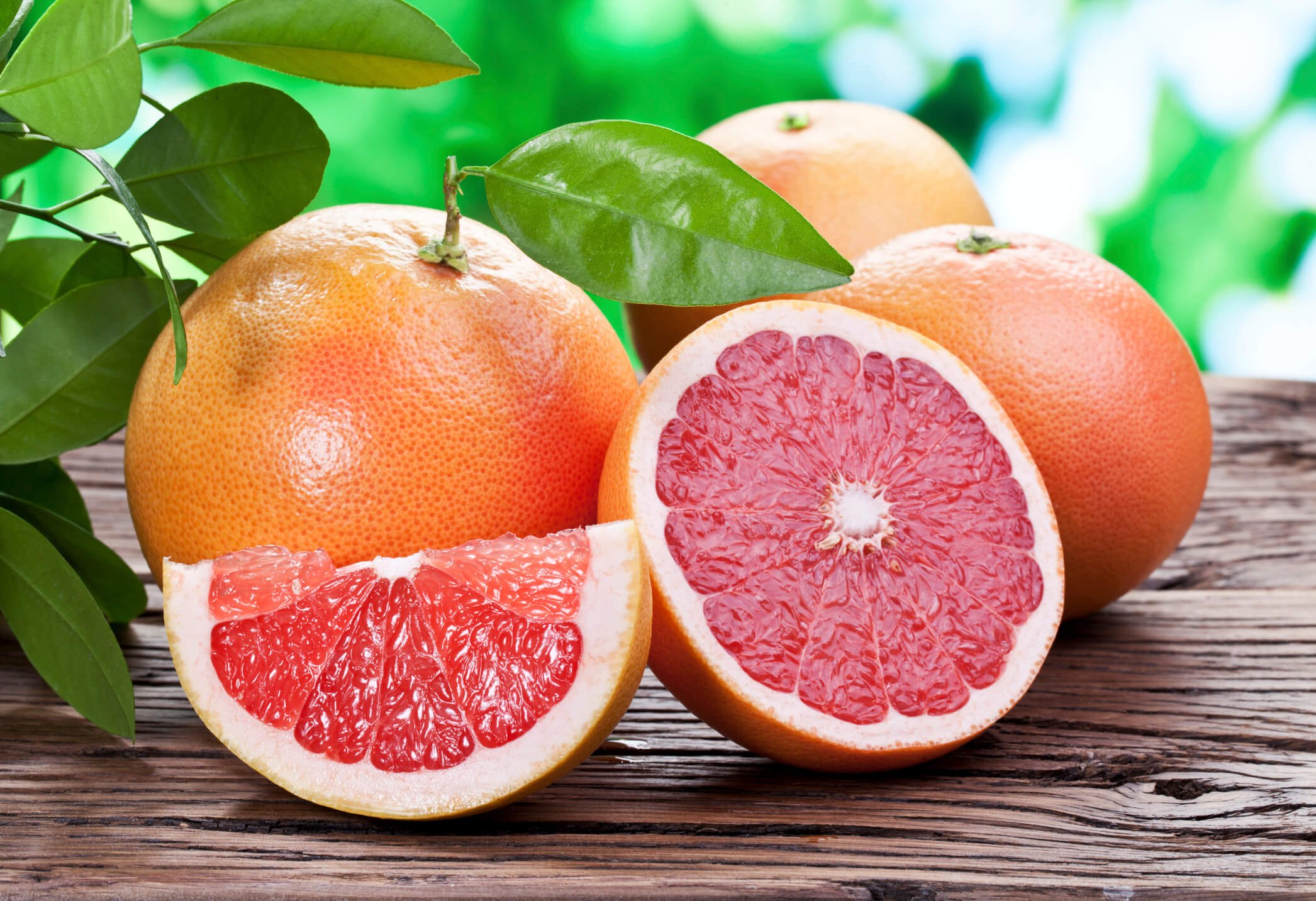In the 1970s and 80s, the average US resident was eating about 25 pounds of grapefruit every year. But decades later, that figure has plummeted to a measly pound and a half.
Why the precipitous drop in the popularity of this softball-sized, sweet, and bitter fruit? Two things, really.
The first was the decline of the Grapefruit Diet, a Hollywood-led fad that took off in the 1930s thanks to its movie star endorsements and was revived again in the 80s as the “10-day, 10-pounds-off diet.” This fad diet came about from the erroneous notion that eating a grapefruit before every meal triggered some kind of magical fat-burning reaction in your body. But by the 1990s, this theory had been debunked, and new fad diets arose to fill the vacuum.
The second factor leading to grapefruit’s decline has been a pharmacological debate over whether the fruit is dangerous to people taking certain medications. Funnily enough, this property of the grapefruit — the ability to interfere with many prescription drugs — was discovered by accident during a clinical trial looking for something else entirely.
In the 1980s, researcher David Bailey was trying to assess the impact of drinking booze on a blood pressure medication called felodipine. He needed a way to blind his test subjects, so they couldn’t tell if they were receiving alcohol or a placebo. His solution was to spike both liquids with grapefruit juice (I’m told that grapefruit juice with vodka is known as a “greyhound.”) Imagine his surprise when the juice caused levels of felodipine to rise in both the treatment and placebo participants.
Over time scientists went on to determine that grapefruits could theoretically interact with about half of prescription drugs on the market. And thus, grapefruit’s fall from grace was complete. Not only did it not miraculously burn calories, but it could render some pharmaceuticals either inert or aggressively dangerous. Yikes!
But for all its marketing problems, grapefruit is a proud member of the citrus family and is a good source of vitamin C and other antioxidants. So what’s the scoop on grapefruit? Nutritional hero or villain?
In this article, we’ll look at the science behind grapefruit’s actual health benefits, and review its potential downsides, particularly, who should exercise caution to avoid unwanted medication interactions.
Types of Grapefruit
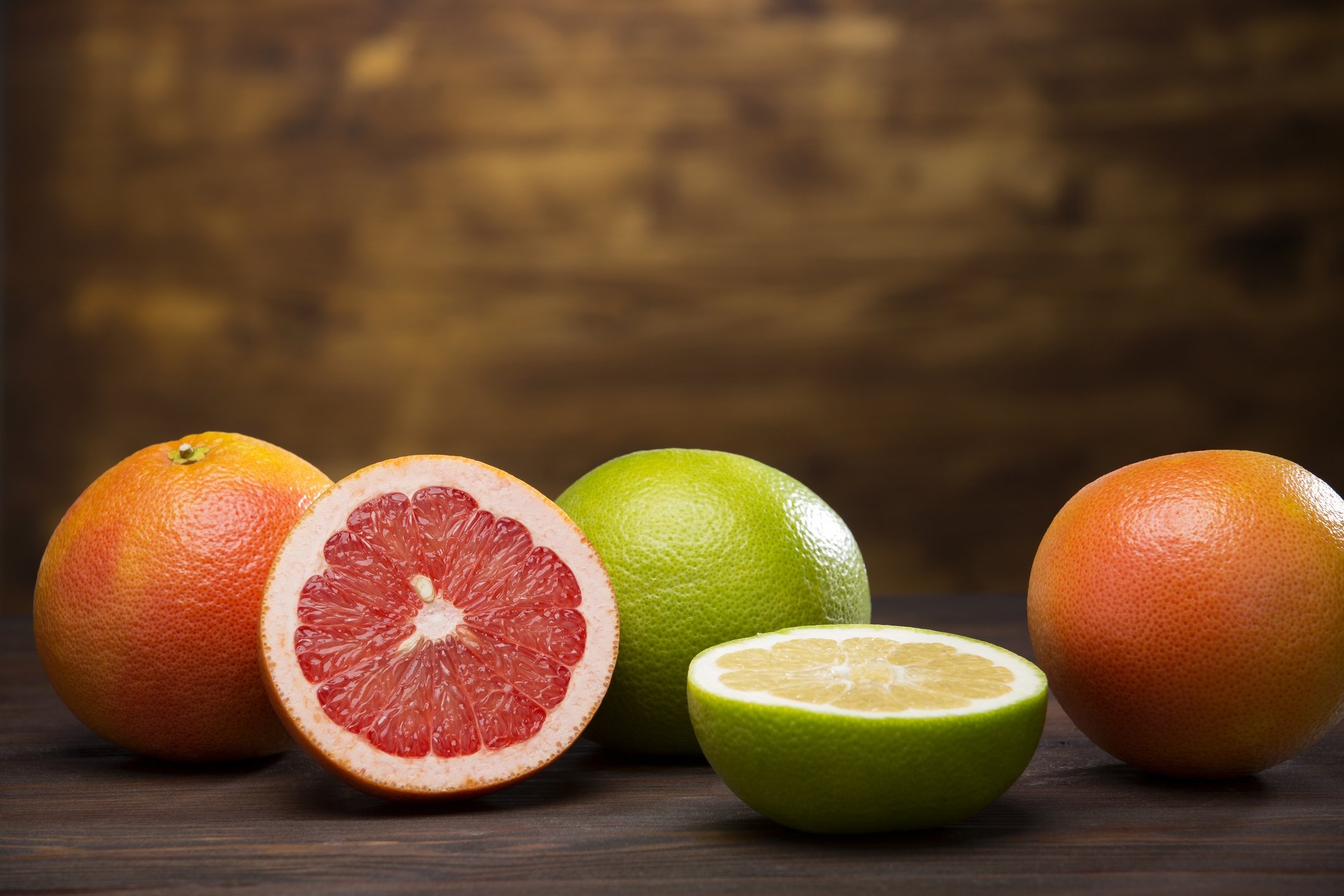
Grapefruit is part of the citrus family. But unlike most of its other citrus friends, which originated in Asia, the grapefruit was first cultivated in the Caribbean, likely on the island of Barbados.
Its botanical lineage is also complex. Grapefruit’s parents were likely a sweet orange and a pomelo, but the orange itself is a cross between a pomelo and a mandarin. I’m guessing that family reunions can get awkward.
Because of its hybridization, grapefruit comes in a range of flesh colors, from white to pinkish, peach, red, and even golden (this last is a mutation derived from white grapefruits). The color signals the fruit’s nutritional content; the redder the flesh, the higher its concentrations of lycopene and carotenoids.
The most popular grapefruit varieties sold for eating are red-fleshed grapefruits grown in Texas. Florida boasts the more common pink and white fruits that typically end up in bottled grapefruit juice.
Grapefruit Nutrition
Like its other citrusy cousins, grapefruit is a rich source of many important nutrients. In addition to vitamins A and C, and the mineral potassium, the fruit delivers a list of phytonutrients that deserve their own verse in “My Favorite Things”: flavonoids, limonoids, carotenoids, terpenes” (feel free to sing along), as well as coumarins (which I couldn’t fit into the song’s meter but are just as important as the others).
Two of those flavonoids are named naringin and narirutin, which sound like Grimm fairy tale characters who disappear in a puff of smoke if you guess their names. In reality, they’re potent free-radical scavenging antioxidants that give grapefruits their distinctive bittersweet taste.
Other phytonutrients in grapefruit include beta-carotene and lycopene, which as we’ve seen, contribute to the flesh tone of the redder varieties.
Grapefruit is a pretty good source of fiber, too, which is severely lacking in the modern industrialized diet. If you eat grapefruit rather than drink its juice, you’ll get roughly four grams of fiber per fruit. Grapefruits are also low in calories, being mostly made up of water. That’s why those Grapefruit Diets appeared effective — in the short-term — because they did cause weight loss due to being very filling and very low calorie.
The Health Benefits of Grapefruit

Although grapefruits aren’t a miracle weight loss tool, they can contribute a significant number of health benefits. So let’s look at what the evidence says about how grapefruits can benefit your health.
Can Grapefruit Help You Lose Weight?
Since many people still associate grapefruits with extreme dieting, let’s begin by looking at the evidence that eating grapefruit can help combat obesity and its accompanying metabolic syndrome.
There’s reason to believe that adding grapefruits to your diet — in moderation (please don’t eat three a day while severely restricting all other calories) — can help you lose excess weight. While most research has been done either in test tubes or on animals (our view on the use of animals in medical research is here), there are a number of studies showing weight loss as being linked to grapefruit or grapefruit juice consumption in humans.
One possible mechanism for this involves naringenin, a metabolite of naringin that can promote thermogenesis, or the conversion of white adipose (fat) tissue into heat (which might be even better than turning straw into gold).
A clinical trial conducted in 2012 found somewhat conflicting results: six weeks of half a grapefruit prior to each meal didn’t lead to greater weight loss than the placebo group. The grapefruit group did, however, exhibit more favorable cholesterol readings at the end of the trial compared to other participants.
Grapefruit and Blood Sugar
Grapefruit may also positively impact blood sugar balance. That 2006 study I just mentioned also found that those who consumed whole (unjuiced) grapefruit lowered their insulin resistance, which is a key driver of type 2 diabetes. And a 2019 review article notes that naringenin has displayed antidiabetic properties in many test tube and animal studies.
Is Grapefruit Good for Blood Pressure?
Beans may not be the only “fruit” that’s good for your heart. A 2017 meta-analysis of three randomized human trials found that grapefruit consumption was associated with significant reductions in systolic blood pressure. And a 2022 study of post-menopausal women used lots of words that I’m unfamiliar with (multi-omics analysis, anyone?) to basically say that the flavanones in grapefruit juice appear to protect the heart by moderating the expression of genes that regulate inflammation and vascular function.
Grapefruit and Cancer
Grapefruit may also enable the body to fight cancer more efficiently. Sounding a lot like C-3PO in Star Wars, researchers in 2015 identified “grapefruit-derived nanovectors coated with inflammatory-related receptor enriched membranes of activated leukocytes” as having the potential to deliver therapeutic drugs to tumor sites.
One of the coumarins (natural chemical compounds found in plants) that’s relatively abundant in grapefruit, bergamottin, may inhibit the growth of prostate cancer cells, as well as promote apoptosis (programmed death) in those cells. It has achieved promising results across a number of different cancers, including multiple myeloma, leukemia, and cancers of the skin, lungs, liver, stomach, breast, and prostate.
Grapefruit Medication Interactions
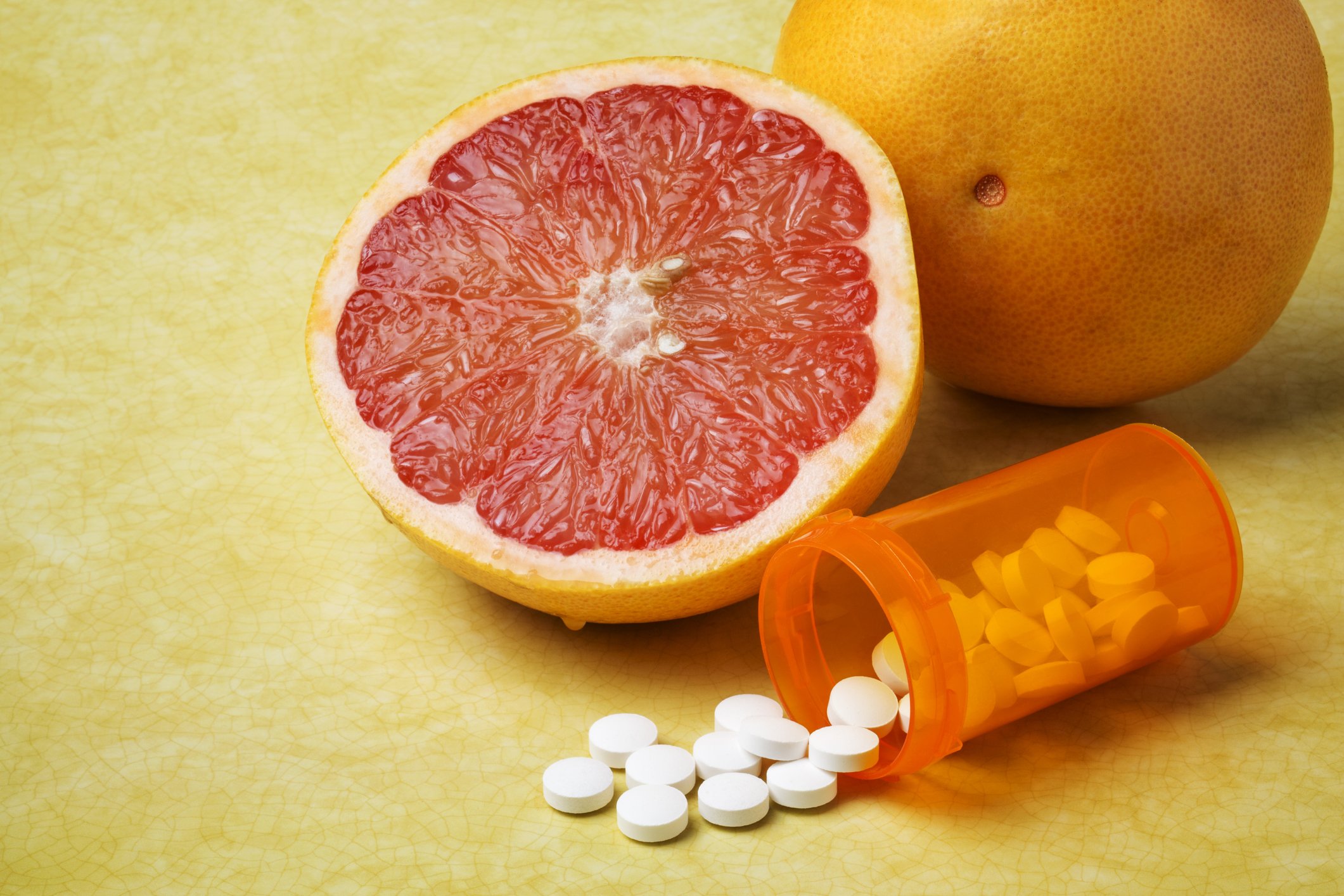
Now that we’ve sung grapefruit’s praises, it’s time to tackle that unfortunate problem of unwanted grapefruit-medication interactions. To give you a sense of the scope of the issue, check out this four-page list of pharmaceuticals with known grapefruit interactions.
Basically, grapefruit blocks certain enzymes that help your body metabolize drugs. And it turns out that just a few enzymes perform this trick on a vast array of drugs, which explains the long list of impacted medications. One of these enzymes, CYP3A4 (no relation to C-3PO, as far as we know), serves as the main “garbage disposal” for these meds. And naringin from grapefruit essentially gums up the works of that disposal system, allowing the drug to remain bioavailable and active in the body far longer and in far higher concentrations than normal.
Naringin can also block transporters that allow you to absorb certain drugs and may even decrease the amount of other drugs. In some cases, grapefruit could make the medication more potent. In others, it may render it less effective. In some cases, it could alter the impact of certain medications. And in others, it might do nothing at all.
If that sounds confusing, consider that the severity of any grapefruit-medication interaction depends on the amount consumed, the particular drug in question, and your own unique metabolic response to that drug (and to the grapefruit, for that matter).
Some of the drugs that may interact with grapefruit include:
- Statins (to lower cholesterol)
- Calcium channel blockers (to treat high blood pressure and coronary heart disease)
- Anticoagulants and antiplatelet medicines (to prevent clots that can lead to heart attacks and strokes)
- Ciclosporin and immunosuppressants
- Entocort (for Crohn’s disease)
- Cytotoxic medicines
- And central nervous system (CNS) agents (including psychiatric drugs)
How about taking your medication a few hours apart from consuming grapefruit? Not a good idea. If you’re taking any of these pharmaceuticals, you may really need to avoid grapefruit entirely. Grapefruit’s ability to affect medication can last up to three days.
Is Grapefruit Dangerous?
Now, I don’t want you to get needlessly alarmed here; there’s a vigorous debate about whether these grapefruit-drug interactions are all that serious for the average medication user. Some clinical researchers see danger across the board, while others downplay the risks.
When David Bailey first started sharing his findings in the 1990s, a common reaction was, “Where are the bodies?” While morbid, what the question is really asking is, if this is a big problem, why hasn’t the medical establishment been seeing its effects for decades — with lots of people killed by grapefruits? Possibly because it isn’t that much of a problem; and also possibly because no one knew to look for it until Dr. Bailey handed out those fateful placebo greyhound drinks in 1989.
But better to be safe than sorry. So, whenever you receive a new prescription, you may want to talk to your healthcare team if you include grapefruit in your diet, to avoid a potential medication interaction. And if you’re currently taking prescription medications, you may want to talk with your team before adding grapefruit, to make sure it’s safe for you.
How to Eat a Grapefruit

Almost as popular as cute animal videos, “the right way to cut a grapefruit” is practically its own YouTube genre, suggesting that a lot of people have been wondering how to do so for a while. If you’re able to eat grapefruit, there are several ways to enjoy it without having to rip it apart with your bare hands or get a sharp splash of juice in your eye as you stab it with a spoon.
On its own, the classic way to eat grapefruit is by cutting it in half and scooping out the pulp and juice one spoonful at a time. This becomes a lot easier when you use a grapefruit spoon, which is serrated on the sides.
Here are three other ways to cut and serve grapefruit:
https://www.youtube.com/watch?v=Wqo5N9gYFoQ
You can use grapefruit in recipes, including salads, mocktails, smoothies and smoothie bowls, frozen desserts like popsicles and n’ice cream (that’s ice cream minus the dairy), and sauces and dressings both sweet and savory (think salsas).
You can also squeeze grapefruits and drink their juice. The downside of this is that you’ll lose most of the fiber, which not only promotes satiety but also slows down the absorption of the fruit’s sugars. Eating the whole fruit is generally a healthier option, especially if you have an issue with blood sugar regulation.
That said, if you really want a cup of citrus juice in the morning, grapefruit juice delivers less sugar than orange juice and is far more palatable than lemon juice.
Grapefruit Recipes
We hope these fresh, bright, and zingy grapefruit recipes spark a few new creative ways to get your grapefruit fix. Even if you’ve been a grapefruit detester in the past, trying out these grapefruit recipes may bring newfound admiration for this bitter and juicy fruit. That said, no matter which way you decide to enjoy grapefruit, we’re sure these recipes will dazzle and delight your tastebuds!
1. Caramelized Cinnamon Grapefruit
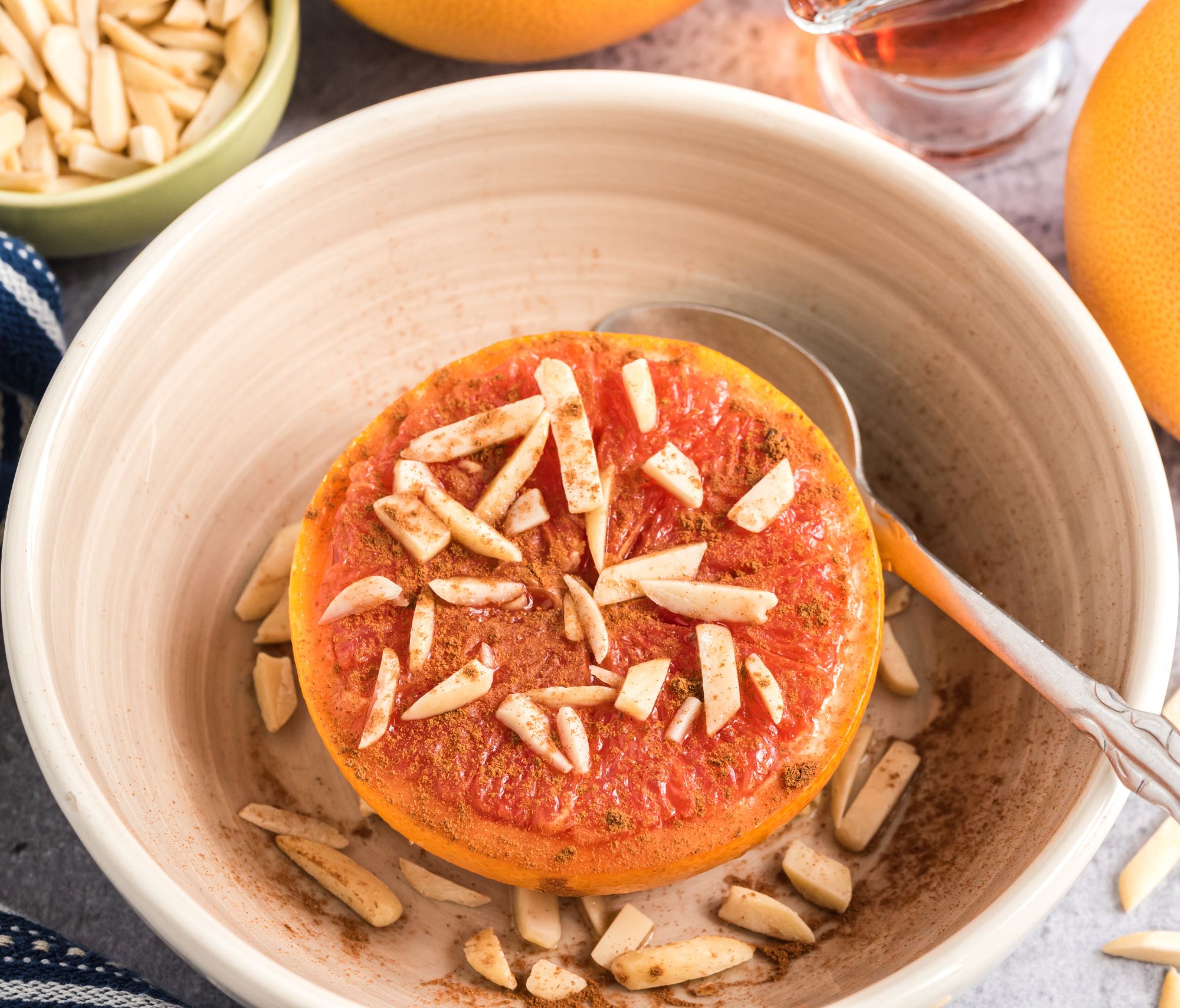
While cinnamon and maple syrup might not be two flavors you associate with grapefruit, the flavor combination is surprisingly delightful. The natural sweetness from the maple syrup and the earthiness of the cinnamon balances the tart bite from the grapefruit, making it a delicious and refreshing snack. There are also bursts of nutrients like vitamin C and lycopene in this unique, plant-based pairing. Give it a try — we hope you love it as much as we do!
2. Summer Citrus Salad
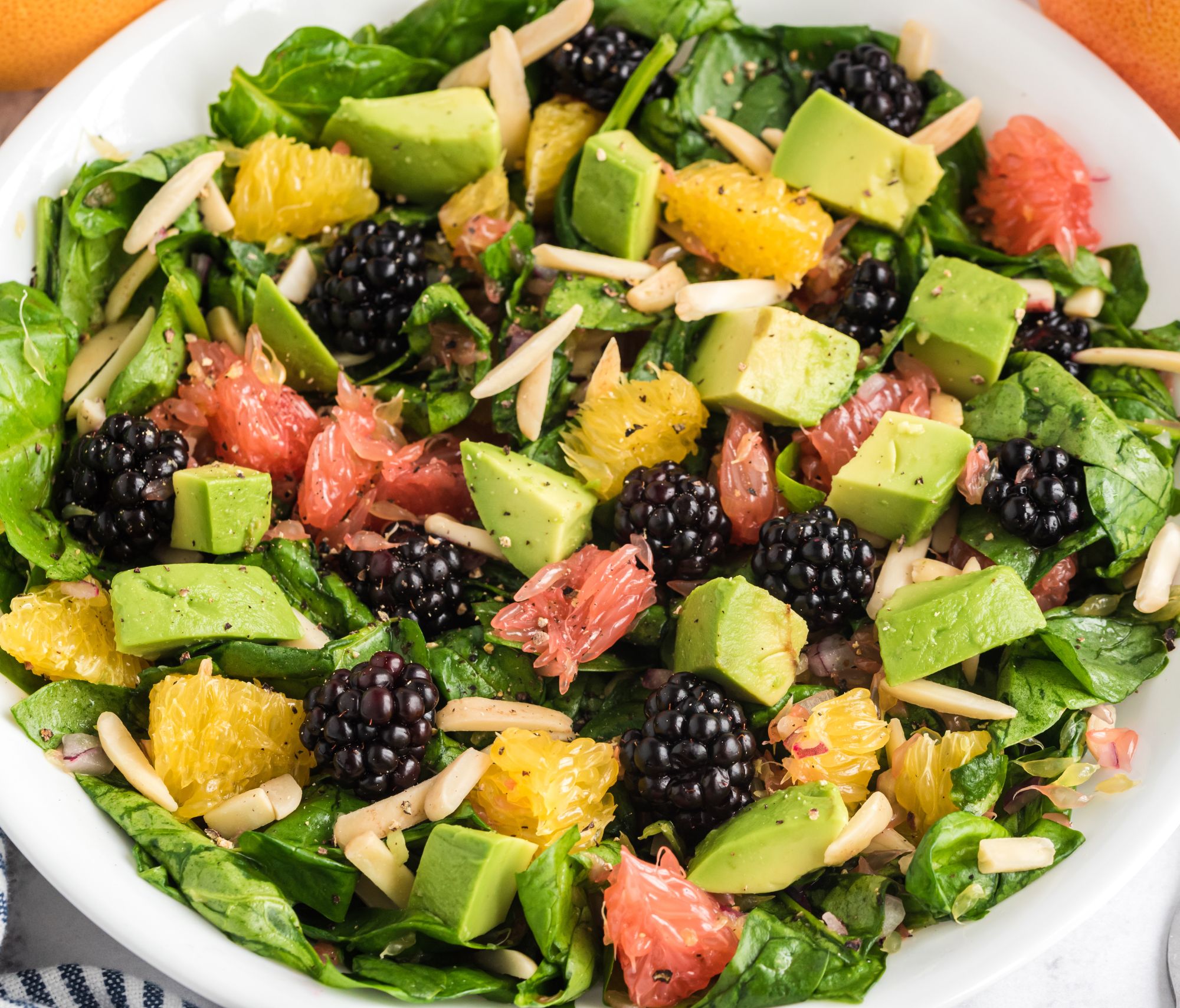
This Summer Citrus Salad is as refreshing as it sounds. Juicy grapefruit, sweet and floral oranges, and tart blackberries are tossed in bright and zesty lemon juice. Together these tantalizing fruits create the ideal balance of sweet and sour that is simply a must-try! If you’ve been on the fence about enjoying grapefruit solo due to its bitterness, this salad is a great way to mellow out some of that flavor. If that’s not enough to convince you to give it a try, the sweet and zesty smells of all the fruits together may get your mouth watering.
3. Minty Grapefruit Tea

Minty Grapefruit Tea may sound a little unique when it comes to melding strong flavors together, but trust us — it works! When steeped, mint leaves produce a slightly sweet flavor in addition to the cooling menthol. And grapefruit adds a bit of citrusy brightness and zing. Together, they create a comforting and cozy cup of tea that’s comforting and uplifting. Enjoy this refreshing tea, hot or iced, with or without your preferred sweetener of choice.
Grapefruit Can Be a Great Fruit!
Grapefruits have long been associated with health and weight loss, often without any scientific basis. But despite its prominence in fad diets of days past, grapefruit does offer a number of real health benefits to consider.
If you are taking prescription medications, however, you may want to avoid or modulate your intake of grapefruit and grapefruit juice. But if that isn’t an issue for you, grapefruit can be a wonderfully healthy addition to a diverse diet for its vitamin, antioxidant, fiber, and flavonoid content. Not to mention its zesty flavor!
Tell us in the comments:
- Do you eat grapefruit? If so, what’s your favorite variety?
- Have you ever been told by a healthcare professional to avoid or limit grapefruit consumption?
- What’s your favorite way to cut and eat grapefruit?
Featured Image: iStock.com/ValentynVolkov
